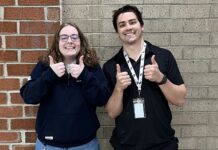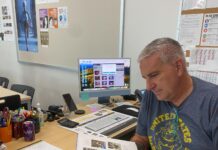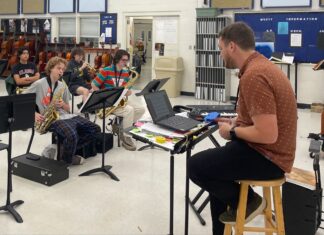
Many of us have a competitive drive that pushes us to work harder and strive to be the best. Athletes can use their competitive drive to their advantage on the field, but what about those whose interests don’t revolve around sports?
CyberPatriot—The National Youth Program offers students interested in computer science an opportunity to use their talents in a competitive environment while representing their school.
Chapel Hill High School’s CyberPatriot’s club fielded three teams in the CyberPatriot National Semifinals, which were held January 21-22. Team A finished in 2nd place in the State Platinum Division, Team B finished first in the State Gold Division, and Team C came in 1st place in the State Silver Division.
The club is centered around the Air Force Association’s CyberPatriot Competition, which focuses on cyber defense. Competitions have at least three rounds, each round lasting six hours. Team members specialize in different fields of computer science. For example, there are window specialists, as well as network engineers.
“The teams did wonderful this year,” club advisor Jennifer Walker said. “We had two teams with all new participants—teams B and C. The fact that both of those teams made it all the way to the semis says a lot.”
Walker helped start the CyberPatriot club at Chapel Hill High School after realizing that the network engineering and computer engineering courses she teaches do not cover cyber security.
“I love to watch the students in action,” Walker said. “They work independently as well as together as a team to solve the problems presented. They welcome and enjoy the challenges and also enjoy their time together.”
Senior Tyler Arnold, a member of Team B, was inspired by Walker to join the CyberPatriot club.
“It has been super fun,” Arnold said. “During the days of the competition, my group works together to solve security problems and we have all increased our cyber security skills and have gotten ready for real-world problems.”
Team members worked together to secure computer operating systems, including Ubuntu, a Windows Server and Windows 10, as well as computer networks.
“Ubuntu is a Linux-based operating system, while Linux is a type of open source operating system on which several other operating systems are based,” senior co-captain Alison Teske said. “Windows is a Microsoft operating system, and there is a specific Windows version used for server operating systems called Windows Server.”
A team’s score is dependent on how well it secured the network and images. After competing, the team is then ranked nationally.
“The teams did great this year. All three of our teams advanced to the semifinals. Only five teams from North Carolina made it to the semifinals, so we made up over half of that,” senior co-captain Jacob Dang said.
Early on in a competition, teams are challenged with fairly basic cyber security problems. For example, during the last competition, Dang was responsible for configuring the Windows system.
“Some of the things I had to do were remove malicious software or video games, ensure all the users are configured correctly and check various security settings. There are also forensics questions that we have to answer,” Dang said.
The forensic questions can be about a specific computer virus or a general cyber security idea; for example, a competitor might have to decipher an encrypted message.
As the competition carries on, the challenges become more of a collaborative effort. Team members must put their heads together to diagnose and solve any remaining issues with their computers.
The CyberPatriot club faced its fair share of struggles due to the pandemic. The club had to hold all of its meetings and competitions online last year.
Teske had been a part of CyberPatriots since her junior year, but, due to COVID, hadn’t been able interact with her team and compete in-person until this year.
“I find that it is way easier to exchange ideas and collaborate in person. Competing online puts you into more of your own bubble and makes it feel more like yours is the only challenge there is,” Teske said. “When you are in-person, even when you are mostly working alone, being in the same room as the rest of the team makes it easier to exchange updates on challenges, hear what others are doing and coordinate collaboration.”
Even with the challenges the club has faced over the past few years, it continues to inspire students to pursue their interests in cyber security.
“It’s been very enjoyable to participate in CyberPatriot. I’ve learned a whole lot of new things, and got to meet new people with similar interests,” Dang said.
CyberPatriot—The National Youth Cyber Education Program was established by the Air Force Association, and the Northrop Grumman Foundation is the presenting sponsor for the organization.











